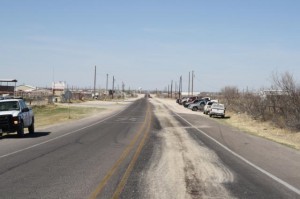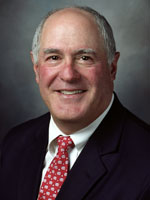Down the Drain: Who’s Watching Chemicals Used in Oil Drilling?

Courtesy Ector Co. Environmental Enforcement
In Ector County, officials say roads like this have been used for years to dump oilfield waste, leaving lanes coated with slippery fluids.
A case of alleged dumping of possibly thousands of gallons of chemicals into Odessa’s sewer system has local officials wondering who’s supposed to police the drilling industry.
“We’re finding that there’s so much confusion in this area of law regarding who is responsible for what,” said Susan Redford, the Ector County Judge. “So in Ector County, we have taken the lead upon ourselves to investigate the more serious illegal dumping cases and to prosecute those cases both civilly and criminally.”
As StateImpact Texas reported last year, Ector County officials said illegal dumping of oilfield fluids and other hazardous waste from drilling operations has become a big problem. The county used state grants to hire a full-time environmental enforcement officer. With the help of sheriff’s deputies, that officer tracked down illegal dumpers, some of whom were driving tanker trucks full of liquid waste and releasing it onto public roads as they drove along.
Last April, county officials said they were hoping to meet with state regulators to talk about how to better share enforcement of pollution laws in Ector County.
“We’ve never really be able to successfully have that meeting,” Redford told StateImpact Texas earlier this week.
Who’s in Charge of Environmental Enforcement?
Earlier this month, the confusion appeared to continue over who’s regulating the drilling industry when Ector County brought a civil lawsuit against Roywell Services Inc over illegal dumping of chemicals. Roywell Services Inc. “provides multiple services to drillers across Texas and Louisiana including cementing, hydraulic fracturing, acidizing” as well as “acid reclamation,” according to the company’s website.
StateImpact Texas was unsuccessful in getting a response from the Houston-based company, but in the lawsuit filed in early March, Ector County alleges that the company “intentionally disposed of industrial hazardous waste directly into a City of Odessa manhole which was located in their yard.”
The lawsuit contends that Odessa police questioned several of Roywell Services’ employees and were told of a pit on the company’s industrial site along Interstate 20. The employees supposedly told police the pit held a couple thousand gallons of “waste acid, chemical and water mix” that was so “hot” that when they’d throw caliche rocks into the pit, the rocks would bubble and dissolve. According to the lawsuit, in mid-January, the employees drained “some or all” of the mix into a manhole that led to the city’s sewer system.
Odessa’s mayor, David Turner, said the city first became aware that someone was dumping powerful chemicals into their sewers when the city’s sewage treatment plant began malfunctioning. Turner said city employees became detectives, taking samples from manholes to trace the source. Turner said that’s when they came upon the industrial lot along I-20 and “caught them in the act.”
What Did the State Know?
The Railroad Commission of Texas is the primary regulator of the state’s oil & gas drilling industry. The commission’s website says it has “jurisdiction over gas and oil wastes” as well as over the “storage, hauling,disposal or reclamation of wastes generated by these activities.”
But in an emailed response, the Railroad Commission said it didn’t regulate Roywell Services Inc. because it “appears to be an oilfield service company.” The commission said service companies are usually not under its jurisdiction, unless the companies also perform well plugging.
The job of monitoring waste generated by service companies apparently falls to the Texas Commission on Environmental Quality (TCEQ). Previously, TCEQ has told StateImpact Texas that the waste it regulates include “spent solvents” and “unused fracturing and acidizing fluids.”
But in an emailed response to StateImpact Texas’ questions concerning Roywell Services Inc., the TCEQ said the company “currently does not hold any TCEQ authorizations or permits in Ector County.” But the commission added that because of the “current ongoing investigation being conducted by the Ector County Environmental Police,” the TCEQ will be evaluating whether the company needs authorization from the commission to continue operations at the Odessa site.
Local Officials Need Help
David Turner, Odessa’s mayor, said he wished the state would provide a little more help to “give more punch” to enforcing pollution rules in his city and the county.
Susan Redford, the Ector County Judge, said that even with fines and settlements collected from polluters to offset the county’s expenses, enforcing pollution laws is still costing county taxpayers “around $100,000 a year.”
“We could certainly do more if we had more funds for it, but we’re doing the best we can with what we have,” Redford told StateImpact Texas.
State lawmakers from the area said that most of the companies involved in drilling are playing by the rules, and that care must be taken to not add burdensome regulations.

Courtesy Senate of Texas
Texas State Sen. Kel Seliger
State Sen. Kel Seliger, a Republican from Amarillo, said it was clear that Ector County has a problem and shouldn’t have to bear all the burden for pollution enforcement. But, he added: “I’ve not been informed by any of the counties that I represent that there’s something additional that they need, other than the full attention and competence of the regulatory organizations.”
Asked if state regulators needed to be more vigilant in monitoring the use of chemicals and the disposal of hazardous waste generated by oil & gas drilling, State Rep. Tryon Lewis, a Republican from Odessa, said that would likely not be practical.
“Whether it’s TCEQ or the county, there’s a limit to what any agency can do as to monitoring on a day-to-day and a transaction basis the activities in the oilfields. It’s too dynamic, there’s too much going on,” Rep. Lewis told StateImpact Texas. He added: “I think that’s the way it has to be done on enforcement. This is a free country, we’re not a police state. [Companies] mostly comply with the law, people are very good about it. We just have to make sure that bad actors, when they’re caught, that something is done about it and it gets cleaned up.”
State Issues Fine, But Against the City, Not Oilfield Company
So far, there has been one fine issued that relates to what’s in Odessa sewage. Over a year ago, the TCEQ fined the City of Odessa $6,350 for exceeding levels of ammonia nitrogen in the wastewater released from the city’s treatment plant. Now, city officials say they believe that it was the illegal dumping of chemicals into their sewers that caused the treatment plant to malfunction, resulting in the violation. The officials say they now plan to appeal the fine.

